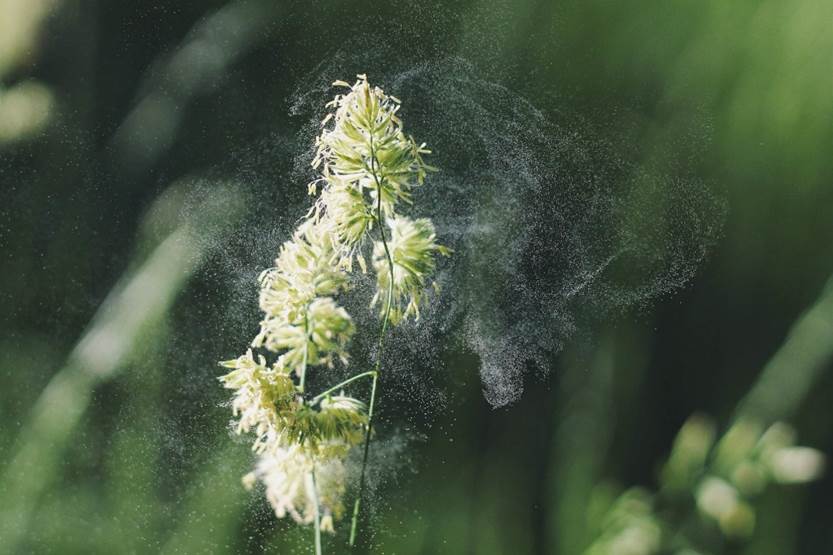Artificial Intelligence (AI) is being used by South African scientists to detect and classify pollen spores in real-time. This may improve the forecasting of bioaerosols that trigger respiratory illnesses like allergic rhinitis (hay fever) and asthma.
South African Scientists Use AI to Improve Pollen Forecasts
Prof. Jonny Peter is head of the Division of Allergology and Clinical Immunology at Groote Schuur and the UCT Lung Institute. He also leads the South African Pollen Network (SAPNET). Prof. Peter says the monitoring of airborne pollen provides an important source of information for the globally increasing number of hay fever and asthma sufferers.
“The worldwide prevalence of allergic rhinitis and asthma rises dramatically each year, both in developed and developing countries.”
Prof. Peter adds that in South Africa, nearly 30% of people suffer from allergic rhinitis. In fact, a recent study from Kwazulu-Natal found that 13.7% of adolescents suffer from asthma – of which 9% suffer from severe asthma.
Monitoring Airborne Pollen
So far, scientists have manually counted airborne pollen and spore types using volumetric air samplers that suck air from the environment. It collects the particles it traps on adhesive tape, which are then analyzed under a microscope by a pollen expert. Yet, the process is cumbersome and costly. With the latest developments in image recognition methods and machine learning, automating this process has become workable.
Prof. Peter says by combining cutting-edge technologies like AI and imaging flow cytometry, which measures the size, count, shape, and structure of a cell, they are able to build a system that is capable of identifying and categorizing pollen more accurately and at much faster rates.
“Also, AI provides a more comprehensive picture of pollen in the present, it can also help to model historic environmental change.
“Pollen grains from different plant species are unique and identifiable based on their individual features. Analyzing which pollen grains are captured in samples from sediment cores in lakes can help scientists get a better grasp on which plants were thriving at any given point in history, potentially dating back thousands to millions of years. Its many applications are transforming the way scientists conduct research and are enabling new discoveries across fields – accelerating scientific productivity.”
How does it work?
Two AI counters have already been set up in Pretoria and Kimberley with two more in Cape Town and Durban coming online soon. Bloemfontein and Johannesburg will follow in the next few weeks.
“It works like the volumetric spore trap that sucks the pollen onto the cellulose membrane, but then it takes a photo of it. From there, AI takes over. The AI is trained using large volumes of images to recognize the individual grains on the sticky tape. The only challenge is that we need to have a period of validation. So, for a time, we will put a conventional volumetric trap next to the automatic AI counter to verify the accuracy of the analysis.
Once the AI has been trained to recognize grains that are indigenous to South Africa, it will be able to quickly classify species. Main allergens, like grass, plane- and cypress trees, as well as fungal species, like Alternaria, Aspergillus, and Cladosporium, should be easy for the AI to identify as these are found around the world.”
“Pollen counts are often difficult to predict during spring when counts are highest, and the weather is changing daily. Having access to reliable, real-time pollen readings will improve forecasting. In turn, it may help hay fever sufferers to mitigate bothersome symptoms that include a runny or itchy nose, sneezing, itchy and watery eyes, as well as nasal congestion.”
2023 pollen forecast with El Niño thrown into the mix
He says this year’s pollen season depends largely on the weather. Yet, hay fever sufferers can expect higher than normal grass counts.
The El Niño weather phenomenon could also influence the timing and severity of this year’s allergy season. In South Africa, it is associated with hot and dry conditions. Yet, certain regions could receive increased precipitation, along with higher-than-average temperatures leading to enhanced pollen production.
“The underlying influence of climate change makes the country vulnerable to the effects of El Niño,” remarks Prof. Peter.
“In Europe, El Niño has caused extreme weather events in the last few months, where some countries have reported earlier starts and extended pollen seasons. In the UK, record grass counts were recorded.”
SAPNET partners with SA Weather Service to help allergy sufferers control symptoms
Prof. Peter says SAPNET‘s recent partnership with the SA Weather Service (SAWS) will also provide access to information related to air pollution. This will include carbon monoxide, sulfur dioxide, and ozone – all of which are linked to the worsening of allergic diseases.
Bottom line
Seasonal allergies affect an estimated 18 million South Africans, which decreases productivity and the quality of day-to-day living among sufferers.
Knowing the daily pollen count will assist hay fever sufferers to better manage their condition throughout the year. After all, grass, weeds, trees, and shrubs pollinate at different times and not just during the peak (spring-summer) pollen period.
References
Mphahlele, R., Lesosky, M., & Masekela, R. (2023). Prevalence, severity and risk factors for asthma in school-going adolescents in KwaZulu Natal, South Africa. BMJ open respiratory research, 10(1), e001498. https://doi.org/10.1136/bmjresp-2022-001498





![women [longevity live]](https://longevitylive.com/wp-content/uploads/2020/01/photo-of-women-walking-down-the-street-1116984-100x100.jpg)










